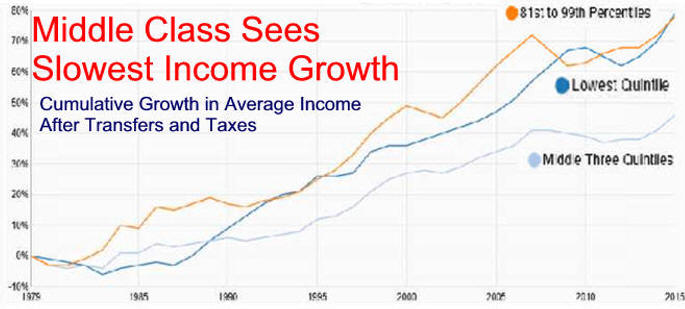Part 1 Neoliberal's
Caused Financial Collapse
I.
Free Market
Neoliberal Economic
Orthodoxies Wrong
A. Finance does affect real economy.
B. Finance system can falter.
C. Many economist wrong because of politics. see
Fake News Warning 7
II. Real Economy Trade Imbalances
did not
cause
the 2007-2008 FINANCIAL CRASH
A. The earlier Dotcom Bubble Crash
did not cause a
banking crises because investors took the loss.
B. World trade imbalances, the
Balance of Financial Terror
were not the root cause the crash.
1. U.S. negative trade balance, as many predicted,
did not cause assets
and a dollar crash.
a. As of 6/18 both have appreciated.
b. See The New
Financial Geopolitics:
Post-Cold War Geopolitics in a World of ‘Long and
Low.’
96 min
2. Loans to Greece from
Germany's trade surpluses
were not the problem
as France and the
Benelux nations
controlled the transatlantic dollar flows
needed for international
trade and to maintain
Exorbitant Dollar Privilege.
a. France runs a small negative trade balance.
b. South Korea currency tanked even though she had
a positive trade
balance and ample dollar reserves.
C. South Korea and the WEST could not get dollars needed
to
fund
the substantial daily borrowing needed for international commerce.
III. Almost all banks were very
highly leveraged
with substantial short term $ borrowing and
Euro
collateral needed for daily
operations
A. When Lemans $180 billion
over-nigh funding needs
were
not met
by the International Funding Market, the entire market crashed.
1. Worldwide credit flows
stopped and
ATMs
would soon be empty.
2. Bad housing loans were
not the problem, rolling over short term
daily funding dollar needs
with poor mortgage debt as
collateral
immediately
would quickly crash the entire financial system.
B. Credit stopped
1. Europe's banks had
become the world's hedge fund for world dollar flows.
Loans were highly
leveraged borrowed in dollars with Euro denominated collateral.
2. Thatcher deregulation of London's financial system made it the
hub of dollar
denominated European bank sponsored debt which flowed into and out of the U.S.
3. The U.S. eventually deregulated to loosened housing mortgage rules
and
help financing of Clinton's
expand minority housing
Community Reinvestment Act.
Credit-default swaps created to safeguard the resulting
low credit rating housing
loans were exempted from regulation by the Gramm-Leach-Bliley Act .
It repealed banking industry safeguards provided by the Glass-Steagall Act.
4. Few banks had dollar
reserves to meet the needs
of the banking and corporate world.
5. Walls Street's model
of an extremely leverage wholesale
funding model
running out of NY
and London would crash.
IV. Is FED Involvement in
a Geopolitical World Appropriate?
A. No as a sovereign debt crisis requires Euro
Central Bank
was the appropriate agency.
B.
No as
Max Plank Institute blames dysfunctional Euro participants.
C. Yes, it was a failure in the Transatlantic Dollar Flows
as described by Mark Blyth.
V. Stability Requires Dollar Supremacy
A. World trade is stable because the world, through
Europe's
banks,
completes the
circular flow of dollars back
to the US
by investing in U.S. companies.
B. Dollar investments are dependent on high Intellectual
Property
generated corporate profits and U.S. economic growth.
1. Investments are
in monopoly power companies:
Apple,
Google, Facebook,
Pfizer and Johnson/Johnson.
2. These profits are politically dependent on
intellectual property rights
created by trade treaties.
C. Distribution of these profits has resulted into an
increase inequality of income.
D. Trump's disrupting this process has many academics apprehensive.
Source
Crashed: How a Decade of Financial Crises Changed the World with Adam Tooze
The New Financial
Geopolitics ─ Europe: Helper, Spoiler, Risk Generator?
from
Watson Institute: International/ Public Affairs
86
min
See
Documentary Of The Week: Steve Bannon At Oxford
2 hr
video
Return to
Political Economy Book Summaries 11/21/18 view horizontally
Please share!
Part 2
Democracy
Failures Caused Latest Popularism
m
summarized from
Francis Fukuyama: Democracy's Failure to Perform
I. Development of
Illiberal Democracy
A.
Causes
1.
Foreign Policy
Failures of Developed Democracy
enhanced by U.S. foreign policy failures
i.e. Middle East wars
2.
Non-Liberal Democracy
success, especially China
3.
Poor Liberal Democracy Performance i.e. economic
slowness, immigration
concerns, wealth accumulation
B. Definitions, nominal
1. States: monopoly
on the legitimate use of force.
from
Max Weber States are about Power!
2.
Rule by Law: sovereignty sets the law i.e. China
3.
Rule of Law: sovereignty responsible to same laws
as the governed.
Laws limit power.
4. Democratic Accountability
requires free political parties
with guarantee substantive
accounting and a
governments
that serves the entire population, not just the
rich and the poor.
Liberals missed this
effect of their policies.

Everyone Got More, Some Just Got More More Than Others!
C. Modern Political System
1. Generate tremendous power limited by the rule of law and is
democratically accountable
2. Patrimonialism: rulers
own political system, resources , distribute wealth
Who You Know
3. Neo-Illiberal States:
look democratic, limited representation,
leaders follow the money
D. U.S. Failures
at State Building
1. Focus: Build a
Liberal Democracy
2. Required focus:
moving from Patrimonial State to Modern Political System
a.
Iraq and Afghanistan: got the liberal
democracy but did not move from
a patriarchal state.
Both states moved to
Oligarchy
where a
few wealthy people
form a
Plutocracy.
Neither protect citizens or provide services to a limited population.
b.
Ukraine: got a liberal democracy from the
Orange Revolution of 2004-5,
but could not keep it
as a second revolution needed to avoid
a strong connection to Russia.
Editor's Note: Ukraine is as important to Russia's safety as Cuba is to
US safety.
c.
India: Very democratic but can't
progress to a modern
state because it
can't fix serious problems.
Elected a strong leader but he to is failing.
d.
Greece: got a democracy in 1974 but developed into a
Clientelism
where
every election brings a
new set of party connected bureaucratic.
Strong unions kept jobs for
previous bureaucrats.
Had seven times the bureaucrats per person as England.
Problem: Greece does not want to change.
See
Crisis
of Capitalism Understood 11 min video


